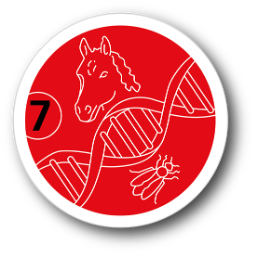- Data collection, measurement and recording of phenotypes for the purpose of establishing zootechnical measures in animal production: How can the objective recording of traits and auxiliary traits in animal breeding be further improved (inter alia in order to meet future market expectations such as the environmentally sound and efficient use of resources, location-adapted, robust, long-lived and healthy animals, the quality of animal products)?
- Breeding methods and technological developments: How can molecular-biological data (‘omics’) be used with maximum possible efficiency in breeding programmes?
- Genetics of health traits: Involuntary cullings due to health problems lead to high losses in livestock production. Which genes promote robustness and resilience? How can health traits be incorporated into breeding programmes, thereby contributing to the achievement of a resource-efficient and profitable animal production sector (e.g. longevity)?
- Genetic diversity: How can the genetic diversity of livestock populations be optimally recorded, described and preserved with a view to the long-term use of animal genetic resources?
- Behavioural genetics: Pleasant behaviour promotes accident-free keeping of, and working with, livestock. It makes herd management easier. Low stress promotes product quality. How can behaviour be taken into account in livestock breeding? Which genes influence livestock behavioural traits? What relationships exist between behavioural, health and production traits?
- Immunogenetics of pollinators: How can the immune-system diversity of pollinators be preserved and promoted? How can adaptable, disease- and pest-tolerant pollinators be selected or naturally encouraged?

A future challenge in animal production will be the more efficient use of resources, coupled with improved animal health and higher animal welfare. Achieving this will require in-depth surveys and analyses of informative phenotypes and the skillful combination of the same with genetic, genomic and metabolomic data. From this, a better understanding of biological processes in animals can be deduced, with the aim of optimised selection.
The focus here is on the development of new, improved breeding programmes to produce more efficient, more robust animals. Maintaining the genetic diversity of local and international races will be a key task in the livestock sector of the future, in order to ensure the adaptability of livestock and long-term progress in breeding.
Scientific Objectives and Research Questions
Research Projects
OverviewFurther Information





